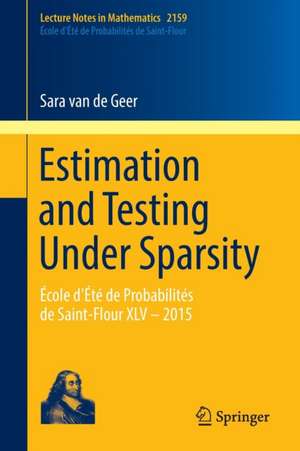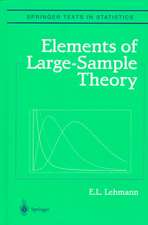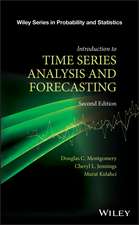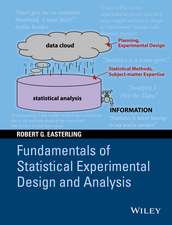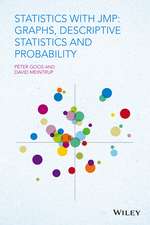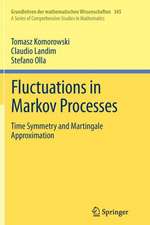Estimation and Testing Under Sparsity: École d'Été de Probabilités de Saint-Flour XLV – 2015: Lecture Notes in Mathematics, cartea 2159
Autor Sara Van de Geeren Limba Engleză Paperback – 29 iun 2016
Din seria Lecture Notes in Mathematics
- 17%
 Preț: 360.42 lei
Preț: 360.42 lei -
 Preț: 459.92 lei
Preț: 459.92 lei -
 Preț: 121.41 lei
Preț: 121.41 lei -
 Preț: 175.68 lei
Preț: 175.68 lei -
 Preț: 197.00 lei
Preț: 197.00 lei -
 Preț: 279.76 lei
Preț: 279.76 lei -
 Preț: 477.65 lei
Preț: 477.65 lei - 17%
 Preț: 361.88 lei
Preț: 361.88 lei -
 Preț: 252.37 lei
Preț: 252.37 lei -
 Preț: 353.99 lei
Preț: 353.99 lei -
 Preț: 138.88 lei
Preț: 138.88 lei -
 Preț: 152.61 lei
Preț: 152.61 lei -
 Preț: 116.67 lei
Preț: 116.67 lei -
 Preț: 102.77 lei
Preț: 102.77 lei - 17%
 Preț: 365.52 lei
Preț: 365.52 lei -
 Preț: 396.75 lei
Preț: 396.75 lei - 17%
 Preț: 362.12 lei
Preț: 362.12 lei -
 Preț: 396.11 lei
Preț: 396.11 lei -
 Preț: 357.78 lei
Preț: 357.78 lei - 17%
 Preț: 362.31 lei
Preț: 362.31 lei -
 Preț: 403.80 lei
Preț: 403.80 lei - 17%
 Preț: 361.70 lei
Preț: 361.70 lei -
 Preț: 499.87 lei
Preț: 499.87 lei -
 Preț: 457.03 lei
Preț: 457.03 lei -
 Preț: 395.90 lei
Preț: 395.90 lei -
 Preț: 459.00 lei
Preț: 459.00 lei -
 Preț: 487.57 lei
Preț: 487.57 lei -
 Preț: 424.01 lei
Preț: 424.01 lei -
 Preț: 487.57 lei
Preț: 487.57 lei -
 Preț: 330.55 lei
Preț: 330.55 lei -
 Preț: 325.75 lei
Preț: 325.75 lei -
 Preț: 350.30 lei
Preț: 350.30 lei -
 Preț: 331.31 lei
Preț: 331.31 lei -
 Preț: 408.37 lei
Preț: 408.37 lei -
 Preț: 328.25 lei
Preț: 328.25 lei -
 Preț: 421.28 lei
Preț: 421.28 lei -
 Preț: 276.08 lei
Preț: 276.08 lei -
 Preț: 424.60 lei
Preț: 424.60 lei -
 Preț: 422.05 lei
Preț: 422.05 lei -
 Preț: 505.01 lei
Preț: 505.01 lei -
 Preț: 422.05 lei
Preț: 422.05 lei -
 Preț: 274.93 lei
Preț: 274.93 lei -
 Preț: 335.16 lei
Preț: 335.16 lei -
 Preț: 422.27 lei
Preț: 422.27 lei -
 Preț: 497.49 lei
Preț: 497.49 lei -
 Preț: 272.81 lei
Preț: 272.81 lei -
 Preț: 428.04 lei
Preț: 428.04 lei -
 Preț: 376.22 lei
Preț: 376.22 lei -
 Preț: 427.10 lei
Preț: 427.10 lei -
 Preț: 325.92 lei
Preț: 325.92 lei
Preț: 421.17 lei
Nou
Puncte Express: 632
Preț estimativ în valută:
80.59€ • 84.37$ • 66.68£
80.59€ • 84.37$ • 66.68£
Carte tipărită la comandă
Livrare economică 05-19 aprilie
Preluare comenzi: 021 569.72.76
Specificații
ISBN-13: 9783319327730
ISBN-10: 3319327739
Pagini: 261
Ilustrații: XIII, 274 p.
Dimensiuni: 155 x 235 x 15 mm
Greutate: 0.41 kg
Ediția:1st ed. 2016
Editura: Springer International Publishing
Colecția Springer
Seriile Lecture Notes in Mathematics, École d'Été de Probabilités de Saint-Flour
Locul publicării:Cham, Switzerland
ISBN-10: 3319327739
Pagini: 261
Ilustrații: XIII, 274 p.
Dimensiuni: 155 x 235 x 15 mm
Greutate: 0.41 kg
Ediția:1st ed. 2016
Editura: Springer International Publishing
Colecția Springer
Seriile Lecture Notes in Mathematics, École d'Été de Probabilités de Saint-Flour
Locul publicării:Cham, Switzerland
Cuprins
1 Introduction.- The Lasso.- 3 The square-root Lasso.- 4 The bias of the Lasso and worst possible sub-directions.- 5 Confidence intervals using the Lasso.- 6 Structured sparsity.- 7 General loss with norm-penalty.- 8 Empirical process theory for dual norms.- 9 Probability inequalities for matrices.- 10 Inequalities for the centred empirical risk and its derivative.- 11 The margin condition.- 12 Some worked-out examples.- 13 Brouwer’s fixed point theorem and sparsity.- 14 Asymptotically linear estimators of the precision matrix.- 15 Lower bounds for sparse quadratic forms.- 16 Symmetrization, contraction and concentration.- 17 Chaining including concentration.- 18 Metric structure of convex hulls.
Recenzii
“This book is presented as a series of lecture notes on the theory of penalized estimators under sparsity. … The level of detail is high, and almost all proofs are given in full, with discussion. Each chapter ends with a section of problems, which could be used in a study setting to improve understanding of the proofs.” (Andrew Duncan A. C. Smith, Mathematical Reviews, August, 2017)
“The book provides several examples and illustrations of the methods presented and discussed, while each of its 17 chapters ends with a problem section. Thus, it can be used as textbook for students mainly at postgraduate level.” (Christina Diakaki, zbMATH 1362.62006, 2017)Textul de pe ultima copertă
Taking the Lasso method as its starting point, this book describes the main ingredients needed to study general loss functions and sparsity-inducing regularizers. It also provides a semi-parametric approach to establishing confidence intervals and tests. Sparsity-inducing methods have proven to be very useful in the analysis of high-dimensional data. Examples include the Lasso and group Lasso methods, and the least squares method with other norm-penalties, such as the nuclear norm. The illustrations provided include generalized linear models, density estimation, matrix completion and sparse principal components. Each chapter ends with a problem section. The book can be used as a textbook for a graduate or PhD course.
Caracteristici
Starting with the popular Lasso method as its prime example, the book then extends to a broad family of estimation methods for high-dimensional data A theoretical basis for sparsity-inducing methods is provided, together with ways to build confidence intervals and tests The focus is on common features of methods for high-dimensional data and, as such, a potential starting point is given for the analysis of other methods not treated in the book
